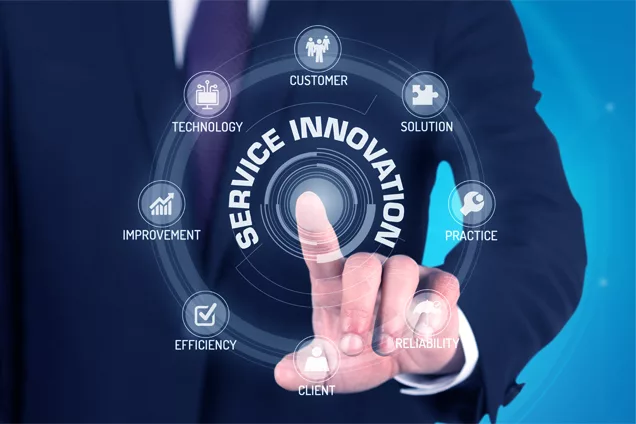Level of CRM Dominant Characteristic Strategic
From Up to down perspective on CRM which views CRM as a core customer-centric business strategy that aims at gaining and keeping profitable customers, in Many start-ups it’s not direct profit as start.
Real value will be building the Data warehouse. eventually it’s payback. CRM technology /systems have become accessible to everyone without expensive licenses and can be worked on as a SaaS or on-demand software without paying exorbitant licensing fees.
Analytical
A bottom–up perspective on CRM which focuses on the intelligent mining of customer data for strategic or tactical purposes
T.C. services are divided into four sections:
1- Environmental analysis and availability of elements
2- Choosing the right technology.
3- Integration with ERP, or standalone setup
4- Training the staff and creating skilled people to lead these processes and make sure (value in place).
1- understanding of customer relationship management. value chain
2- Information technology for CRM.
3- Customer portfolio analysis
4- Customer closer relationship
5- Creating and managing networks
6- Creating value for customers
7- Managing the customer lifecycle- customer acquisition
8- Managing the customer lifecycle- customer retention and development
9- Organizing for customer relationship management

Change Management
Readiness assessments
Communication and communication planning
Sponsor activities and roadmaps
Coaching and management training
Employee development
Resistance management
Data collection, feedback analysis and corrective action
Celebrating and recognizing success


Human Resources Management
In the past few dictates showed measure steps and creation of knowledge base of interest in strategy and human resource management.
Which it was driven by few factors such as complexities, contexts, environments and processes, new business concepts, changing of regulation, recently covid 19 which gave the necessity of active and brained HRM.
T.C. Service with HRM
General Principles
– Connecting strategy & Human resources management.
– Managing employee’s voice.
– Linking HR systems to organization performance.
Managing People in complex Context’s environments
– Managing Human resources based on industry and competition factors.
– Building educational environment
– Creation of dash boards, KPI’s.
– HR Support & participations Continuity plans
– Selection of Technology & Tools
Other Services:
– Selection and screening of HRM personals
– Building HRM polices and strategies.
– Change Management
– Coaching
– Skills improvement
T.C . services
2- Process definition, which requires the description of existing processes.
3- Process documentation
4- Process analysis and control
5- Process improvement
6- Aligns the process to serve org. vision and mission

IT Selection of technology, Compliance, SOP’s & Alignment with Vision
ERP systems, if correctly implemented in organizations, allow clients to establish a good baseline for operational processes, increasing the required control level, establishing data reporting mechanisms and supporting the organization’s defined functions. An inappropriate software selection or a mistaken implementation may generate major problems to your organization, such as: costly and extended projects, a solution that does meet the main needs of the company, insufficient support from the supplier, staff reluctant to use the solution, omitted controls during the implementation stage, which may expose the organization to fraud, among others.
T.C. Consultation offers the best solutions for ERP implementation projects to maximize the investment made by your company. These solutions include:
Data Analysis and Migration
Diagnosis prior to ERP Implementation Project (processes, organization, data)
ERP Advisory Services
Management of ERP Implementation Projects
Change Management for ERP Implementation Projects
Analysis of Function Segregation and ERP Access Configuration
Software Selection Processes (RFP, Evaluation of Solutions and Suppliers)
Risk Management for ERP Implementation Projects
Financial analysis (TCO) for ERP Implementation Projects


Supply Chain Management
Supply Chain is playing an increasingly important role in value creation, revenue enhancement, capital consumption, and expense control. As a result, Supply Chain financial performance is playing a bigger role in corporate financial performance. Measuring and improving Supply Chain financial performance is increasingly important in measuring.
8 key processes that make up the core of supply chain management:
– Customer Relationship Management
– Customer Service Management
– Demand Management
– Order Fulfilment
– Manufacturing Flow Management
– Procurement
– Product Development and Commercialization
– Returns

5 point T.C. service Provides to implementation of supply chain management include:
– Executive support, leadership and commitment to change
– An understanding of the degree of change that is necessary. By creating full communication channels with stakeholders.
– Agreement on the supply chain management vision and the key processes.by align SCM process to vision.
– The necessary commitment of resources and empowerment to achieve the stated goals
– metrics introduced to evaluate performance beyond the borders of the firm
What We can offer as service:
– Conducting work shop in two levels: Executives & Project team & stakeholders
– Formulation of SCM. Strategy
– Selection of Technology.
– Supply chain transformation
– Risk Management sustainability
Strategy Consulting & Business plans
Why do organisations use strategy consultants?
Many wonders do we need consultants to develop solutions?
Let’s question the followings: As per Harvard business review
- What are our broad aspirations for our organization & the concrete goals against which we can
measure our progress? - Across the potential field available to us, where we will choose to play and not play?
- In our chosen place to play, how will we choose to win against the competitors there?
- What capabilities are necessary to build and maintain to win in our chosen manner?
- What management systems are necessary to operate to build and maintain the key capabilities?

From Operation side:
- How much time does the company’s management spend on the zero budget, is it more than 30 days?
- Does the management make sudden fundamental changes without the knowledge and communication with employees and department managers?
- Is there a vision of what the company wants to achieve, and this vision has actually been achieved over the course of 5 years.?
- In Case of crises or business slow down, are they using the short and the bad outlook in the medium- and long-term cutting cost and layoff employees? Or reducing salaries.?
- Is the company owning diversity or planning for it?
T.C. experts will identify the right approach, porose and implement corporate & business strategies that’s fit your organization.
Risk Management
Who need Risk Management:
– In any regulated industry. Seeking to better understand and mitigate the risks it faces across the entire organization.
– who need to measure and improve existing risk and forecasting future risks management arrangements
– Who is looking to coordinate and validate its risk management efforts across the enterprise.
Risk Management
Experts will analyze risk from an integrated perspective, exploring risk relationships within your workforce, departments, Management team & fully your organization to understand of your company’s material risks. Whether your company is just started the enterprise risk management journey or has an
established framework in place, we can assist you in your efforts.
Steps and phases:
A) Identify the risk.
B) Analyse the risk.
C) Prioritize the risk.
D) Treat the risk.
E) Monitor the risk.



